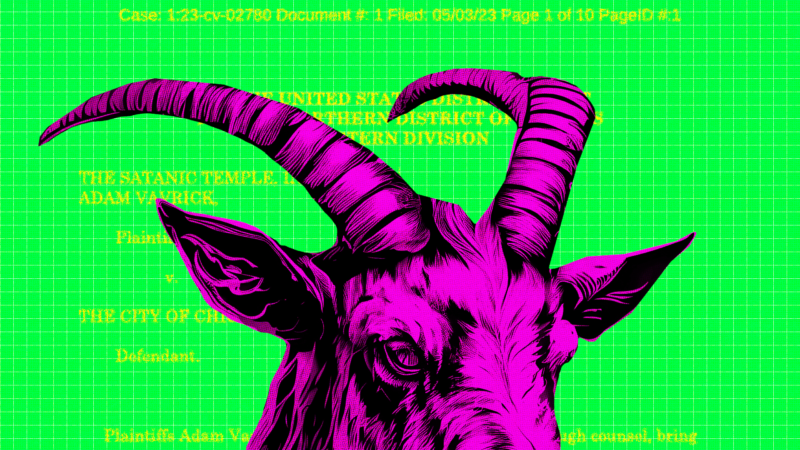The Satanic Temple Sues Over Right To Give 'Invocation' at City Council Meetings
"When the government picks and chooses among religions," the lawsuit reads, "religious liberty is threatened for all."

The Chicago City Council, like many other legislative bodies, typically opens meetings with an "invocation"—essentially, a prayer or moment of reflection. Clergy from a wide range of religious backgrounds have given these invocations, and a Satanist minister wants to join their ranks. But the city has refused to let him—and refused to explain the decision. Now, this minister has filed a First Amendment lawsuit against the city.
The Satanic Temple is a nontheistic religion that, as noted by the lawsuit, is "federally recognized as a church and a religious public charity." Contrary to popular belief, members of the group don't actually worship Satan. Instead, they follow a series of seven "Tenets" focused on broad ideas of compassion, rationalism, and freedom.
The Satanic Temple has often tested religious-freedom policies and challenged anti-abortion laws on religious-freedom grounds. Just this month, the group experienced a significant legal victory after it won its lawsuit against a school district that attempted to block the formation of an "After School Satan Club." It also celebrated when in 2015 a large Ten Commandments monument was removed from the Oklahoma state Capitol following a protest by the group and a lawsuit by the American Civil Liberties Union.*
This most recent lawsuit, filed on Wednesday, marks at least the third time The Satanic Temple has sued after being blocked from giving an invocation or prayer before a legislative body. Adam Vavrick, the ordained minister in the religion, unsuccessfully sought to perform an invocation at a Chicago city council meeting. According to the suit, Vavrick began his efforts in January 2020, when he spoke to Chauncy Rice, the then-chief of public engagement for the Office of the City Clerk, who told Vavrick "that he would be happy to schedule him to provide an invocation after 'standard vetting procedures."
"For the next several months, Minister Adam followed up with Mr. Rice approximately once a month to inquire about the status of his request to provide an invocation," writes the complaint. "These emails went unanswered." The same outcome occurred when Vavrick attempted to schedule an invocation with Rice's successor.
Eventually, Vavrick retained a lawyer, who contacted a city attorney who "was unable to articulate the process for seeking to provide an invocation and could not say whether the City would permit Minister Adam to deliver an invocation."
"The City has never formally rejected Minister Adam's request to provide an invocation," the complaint states. "Rather, the City has simply resisted scheduling him for more than three years without providing a definitive answer about whether he will ever be permitted to provide an invocation."
Vavrick's lawsuit against the city argues that, in failing to schedule him to give an invocation, it has engaged in blatant religious discrimination.
"By excluding Plaintiffs Vavrick and The Satanic Temple from providing an invocation before the City Council, while opening this forum to clergy from other faiths, Defendant violates the First Amendment's establishment clause," the lawsuit claims, adding that "the lack of any policy setting standards and criteria for selection of clergy members to provide an invocation before City Council violates the First Amendment because it vests unbridled discretion with the City Clerk, creating an unreasonable risk of arbitrary and discriminatory decision-making."
While it's possible that other factors, like simple incompetence, could have contributed to Chicago's failure to schedule a Satanic Temple invocation, discrimination against the Temple is clearly prohibited by the First Amendment. Even if Chicago may not like it, Satanists—and clergy from any other disfavored faith—have an equal right to give invocations before the City Council.
As the lawsuit states, "When the government picks and chooses among religions—amplifying some and excluding others from the public discourse—religious liberty is threatened for all."
*CORRECTION: A previous version of this article mischaracterized The Satanic Temple's legal activities.


Show Comments (233)